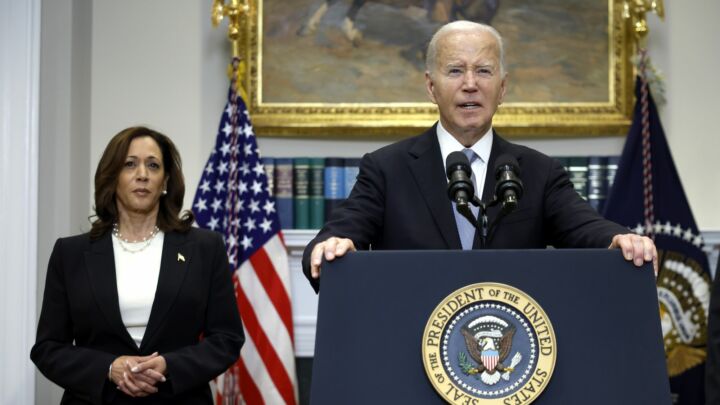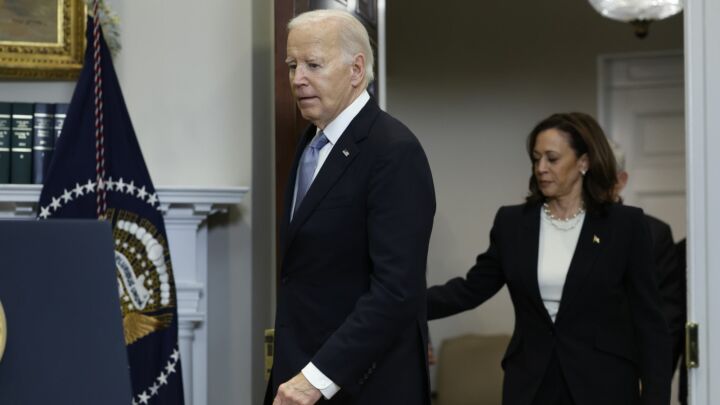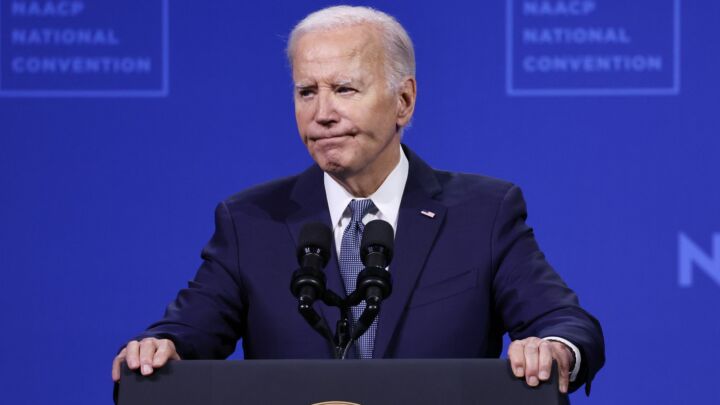Prison for a kiss? #MeToo has lost the plot
The persecution of Luis Rubiales for the infamous Women’s World Cup kiss is a new low for feminism.

Want to read spiked ad-free? Become a spiked supporter.
Remember Luis Rubiales and the World Cup kiss? The former head of the Spanish football federation now faces a potential prison sentence for that blink-and-you’d-miss-it kiss he planted on the lips of footballer Jenni Hermoso, at the end of last year’s Women’s World Cup Final. Whatever you might think about Rubiales and his boorish behaviour, the idea that this second-long peck warrants his incarceration is insane. This must surely be the moment that #MeToo jumped the shark.
Spanish prosecutors have charged Rubiales with sexual assault, and are now pushing for a one-year jail term. Along with three other senior figures in the world of women’s football, Rubiales also stands accused of coercing Hermoso into saying the kiss was consensual. If found guilty, each faces an 18-month sentence. Taken together, Rubiales’s mad moment of over-exuberance could leave him spending up to two-and-a-half years behind bars.
This absurd punishment must serve as a wake-up call to people not just in Spain but around the world, too. If Rubiales is sent down, it would not be a victory for women or feminism. It would be a triumph of the #MeToo movement’s conflation of rape and bad behaviour. It would confirm that spontaneous interactions between the sexes have now been criminalised.
Sadly, Rubiales is not the first man to fall foul of Spain’s punitive laws on sexual assault, which were inspired by the Spanish version of the #MeToo movement. Since November 2022, under what has come to be known as the ‘only yes means yes’ law, consent to sex cannot be assumed by default, even if a woman does not object at the time. It must be ‘affirmative’. In other words, there must be a definite ‘yes’ – presumably in response to some awkward questioning. Anyone who has ever had a relationship knows that this is just not how actual, real-life sex occurs. Intimacy does not involve reciting a script.
Yet, in Spain, sexual contact without some form of explicit, ‘affirmative’ consent is treated as an act of aggression, irrespective of whether or not there was actual violence or intimidation. Hence, in the immediate aftermath of the World Cup kiss, Spain’s minister of equality, Irene Montero, labelled Rubiales’s behaviour a ‘form of sexual violence’.
The new consent laws – passed by prime minister Pedro Sánchez and his then coalition partners, the anti-austerity Unidas Podemos alliance – also removed many of the older distinctions between sexual harassment and rape. This conflated unwanted touching and kissing (however brief or public) with serious sexual assault. The upshot of this is that relatively minor cases of harassment are dealt with far more severely. More worrying still, very serious offences like rape are treated more leniently. This is because the new laws reorganised offence categories, including eliminating any distinction between sexual assault and the hitherto more serious category of sexual abuse. As a result, more than 130 convicted sex offenders have either had their sentences reduced or were freed early from prison.
Almost 18 months on from the introduction of these new laws, there has been a sharp rise in the number of boys who now find themselves in the crosshairs. The number of sexual offences committed by young people aged between 14 and 17 has risen by 14 per cent in just one year. It is now at the highest level since records began. As one Spanish judge notes: ‘We have more and more boys in juvenile detention centres for crimes against sexual freedom.’
Some have blamed this increase on pornography and poor sex education, but it seems more likely that, under the new legislation, clumsy behaviour between teenagers is being criminalised. As a result, boys find themselves up before a judge facing life-changing punishments, while girls are taught to see themselves as victims, even after the most mundane of interactions. It is hard to see how this is any kind of feminist victory.
Yet none of this has stopped feminists calling for similar laws to be enacted in the UK. Prominent UK lawyer Charlotte Proudman has backed the ‘I’m Asking For It’ campaign, which is calling on courts to adopt so-called affirmative consent as a legal standard. According to Cosmopolitan, affirmative consent means ‘yes being clearly asserted by both parties’. This is the magazine that once sold the joys of sexual liberation to young women. Now it’s scaring readers, telling them that unless sex is preceded by clear, correctly phrased affirmations of consent, it should be considered the same as rape.
This is obviously terrible for men, but it is bad for women, too. With the onus, more often than not, falling on men to prove they obtained consent, women are infantilised. Sexual equality flies out of the bedroom window. This affects all couples, even those who never fall foul of the law. The state has effectively been invited into the most intimate part of people’s lives. Spontaneous emotion has been replaced by preordained, legally approved phrases.
In Spain, thanks to the unhinged overreaction to the World Cup kiss, Jenni Hermoso’s name will forever be associated with the kiss, rather than her on-pitch prowess. Meanwhile, Rubiales – father to three daughters and a son – faces time in prison.
If this is what feminism looks like, count me out.
Joanna Williams is a spiked columnist and author of How Woke Won. She is a visiting fellow at MCC Budapest.
Picture by: YouTube / El Independiente.
To enquire about republishing spiked’s content, a right to reply or to request a correction, please contact the managing editor, Viv Regan.









Comments
Want to join the conversation?
Only spiked supporters and patrons, who donate regularly to us, can comment on our articles.